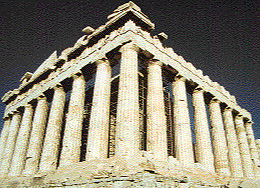 |
PHIL
501
History of
Ancient Greek
Philosophy
Graduate Syllabus Supplement |
| Course requirements, class schedule, and reading list are the same
for 501 as for 401 with these exceptions:
Contact me by email at calhoun@gem.gonzaga.edu |
The Parthenon, Athens, Greece

Graduate Colloquia
We will meet four times during the semester outside of regular class time
at a time to be arranged. Participation in these meetings is required.
During these meetings we will, by mutual agreement, do one or both of the
following: (1) grad students will present short papers of their own for
discussion by other grad students, or (2) grad students will lead discussion
of journal articles on issues raised in the primary readings. Presentations
can take the form of simple summarization of the papers or articles and
raising of questions for discussion, or a brief talk explaining the paper
or article can be substituted. In all, the presentation should take
10-15 minutes, to leave ample time for discussion. Students will
be responsible for supplying enough copies of their papers so that all
grad students are able to read them prior to the discussion. As you
can see, late papers will cause serious problems.
Grad meetings will be held the following weeks:
-
September 13-17, Pre-Socratics
-
October 4-8, Socrates
-
October 25-29, Plato
-
November 29-December 3, Aristotle
Researched Term Paper
In place of the final exam, grad students will be asked to write a research
paper (worth about 25% of the course grade). I strongly suggest that
you base this research paper on one of the shorter papers written during
the semester. I expect you to research and consult some of the relevant
secondary literature on your topic, and also take into account the comments
and suggestions brought out in our grad discussion meetings, as you prepare
your research essay. There will be no length requirements on these
papers, but you should try to treat a focused philosophical topic in reasonably
thorough detail. I am willing to make suggestions on articles and
books for you to consult, but I would also like for you to learn how to
use reference sources in the library and to begin to develop the ability
to assess the quality levels of different possible sources.
Note: Grad students with a cumulative average of B- or lower at the
end of the semester will be required to take the final exam rather than
to complete the research essay.
Graduate Research Methods
Session
I strongly urge (but will not require) that we have one meeting early in
the semester to cover basic graduate research methods and resources at
the Foley Library. If there is sufficient interest, I will arrange
for a librarian to lead an information session for the PHIL 501 group.
Alternate Texts for Graduates
I have higher performance expectations for graduate students than I do
for undergraduates. This expectation includes a presumption that
graduates should work with fuller texts (so far as time allows), and should
also have some exposure to scholarly treatment of technical issues in ancient
philosophy. For these reasons, I strongly recommend that graduate
students purchase the following texts in the place of the undegraduate
anthology:
McKirahan, ed., Philosophy Before Socrates (Hackett, 1994)
Plato, Complete Works, ed. by John M. Cooper (Hackett, 1997)
Aristotle, Selections, trans. by Terence Irwin and Gail Fine (Hackett,
1995)
Graduate Reading Assignments
Click on the link for each day's reading to see the appropriate section
of the Class Preparation
Guide for background information and study and reflection questions.
August 31 Course Introduction
(review McKirahan, Chaps. 1-2 after class)
I. Pre-Socratic Philosophy
September 2 Milesians
and Pythagoreans (McKirahan, Chaps. 3-6, 9)
September 7 Xenophanes
and Heraclitus (McKirahan, Chaps. 7, 10)
September 9 Eleatics: Parmenides, Zeno,
Melissus (McKirahan, Chaps. 11-12, 15)
September 14 Pluralists
and Atomists (McKirahan, Chaps. 13-14, 16)
September 17 Last day to submit Pre-Socratic paper
II. Socrates and the Sophists
September 16 Sophists (McKirahan,
Chap. 18); Protagoras 317e-334c
September 21 Apology
September 23 Crito;
Euthyphro
September 28 Meno
October 1 Last day to submit Socrates paper
III. Plato
September 30 Phaedo
October 5 Republic I
October 7 Republic II-IV
October 12 Republic V, 472b-VI,
506b
October 14 Republic VI, 506b-VII
October 19 Republic VIII-IX;
X, 608d-621d
October 21 Parmenides
October 25 Last day to submit Plato paper
IV. Aristotle (reading references are to work, book,
and sections)
October 26 Physics
I, 1, 5-9; II, 1-3, 7-9
October 28 Pr.
Anal. I, 1; Post. Anal. I, 1-4, 8-11, 18; II, 19; Topics
I, 1-2, 5, 10-11; Categories 1-5
November 2 Metaphysics I
November 4 Metaphysics II;
IV, 1-3; VII, 1-6, 13, 16-17
November 9 Physics VII,
1-3; VIII, 1, 6, 10; Metaphysics XII, 1, 6-10
November 11 On the Soul I, 1-2;
II, 1-5; III, 2-7, 13
November 16 Nicomachean Ethics I-II
November 18 Nicomachean Ethics
III, 1-5; VI, 1-2, 11-13; VII, 1-4
November 23 Nicomachean Ethics VIII,
1-10; X, 3-10
November 25 Thanksgiving Vacation
November 30 Politics I,
1-7; III, 1-7, 13; VII, 1-3, 13-15
December 3 Last day to submit Aristotle paper
V. Post-Aristotelian Philosophy
December 2 Post-Aristotelian
Schools: Skepticism, Epicureanism, Stoicism (reserve)
December 7 Post-Aristotelian Schools; Neoplatonism: Plotinus
(reserve)
December 9 Neoplatonism: Plotinus
(reserve)
Even though graduate students are not normally required to take the
final exam (see above for information
on this policy), students might find the Review
Topics for Final Exam helpful in providing a general overview of the
course.



![]()
